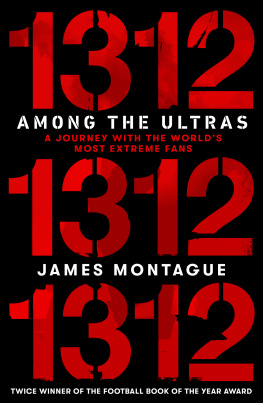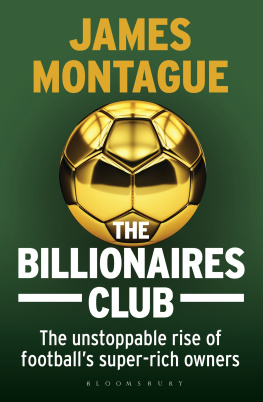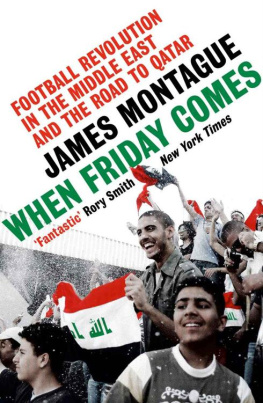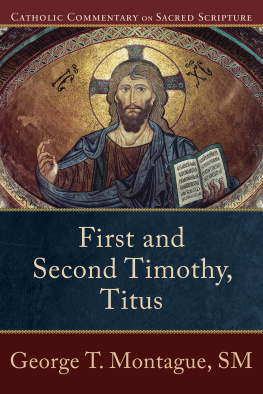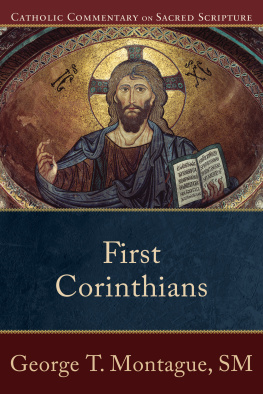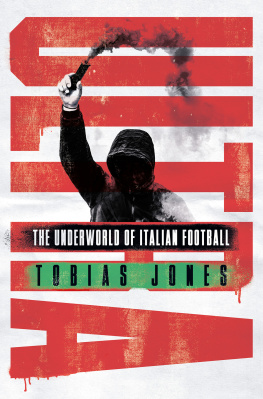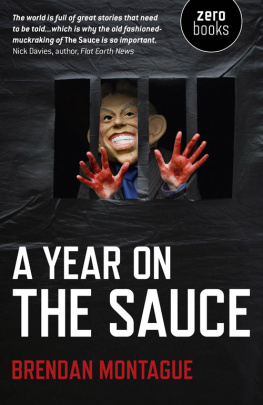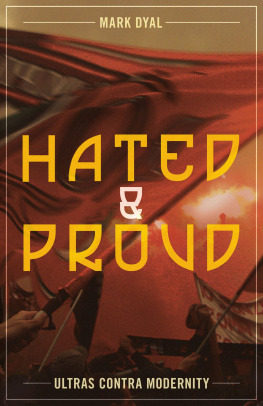James Montague - 1312, Among the Ultras
Here you can read online James Montague - 1312, Among the Ultras full text of the book (entire story) in english for free. Download pdf and epub, get meaning, cover and reviews about this ebook. publisher: Ebury Publishing, genre: Detective and thriller. Description of the work, (preface) as well as reviews are available. Best literature library LitArk.com created for fans of good reading and offers a wide selection of genres:
Romance novel
Science fiction
Adventure
Detective
Science
History
Home and family
Prose
Art
Politics
Computer
Non-fiction
Religion
Business
Children
Humor
Choose a favorite category and find really read worthwhile books. Enjoy immersion in the world of imagination, feel the emotions of the characters or learn something new for yourself, make an fascinating discovery.
- Book:1312, Among the Ultras
- Author:
- Publisher:Ebury Publishing
- Genre:
- Rating:3 / 5
- Favourites:Add to favourites
- Your mark:
- 60
- 1
- 2
- 3
- 4
- 5
1312, Among the Ultras: summary, description and annotation
We offer to read an annotation, description, summary or preface (depends on what the author of the book "1312, Among the Ultras" wrote himself). If you haven't found the necessary information about the book — write in the comments, we will try to find it.
1312, Among the Ultras — read online for free the complete book (whole text) full work
Below is the text of the book, divided by pages. System saving the place of the last page read, allows you to conveniently read the book "1312, Among the Ultras" online for free, without having to search again every time where you left off. Put a bookmark, and you can go to the page where you finished reading at any time.
Font size:
Interval:
Bookmark:



James Montague is an award-winning author and journalist from Chelmsford, Essex. He writes for the New York Times, the Bleacher Report, World Soccer, and Delayed Gratification and has reported from over 80 different countries and unrecognised territories. He is the author of three highly-praised football books: When Friday Comes: Football, War and Revolution in the Middle East, Thirty One Nil: On the Road With Footballs Outsiders and The Billionaires Club: The Unstoppable Rise of Footballs Super-Rich Owners. @JamesPiotr
A lso by J ames M ontague
When Friday Comes
Thirty One Nil
The Billionaires Club
For Mila and Mitra, always
In an expanding universe, time is on the side of the outcast. Those who once inhabited the suburbs of human contempt find that without changing their address they eventually live in the metropolis.
Quentin Crisp, The Naked Civil Servant
T he part of the game I have always found most interesting has also been the most misunderstood: the supporters, and especially the ultras, the hooligans, the barras bravas, the torcidas, the maniacs, however the most passionate and extreme supporters have become known in their home countries. From a young age I was drawn to the danger and the mystery. It was a seductive culture of extremes. Watching that section behind the goal and being inexorably drawn to it was like holding up a magic eye painting. You either saw it or you didnt.
Yet, this was a world I could never be truly accepted by. Journalists are every bit the enemy as the police. Organised support groups are suspicious of those who want to write about them. This has dictated, to some degree, who and where I wrote about. Where access was impossible I decided against writing a full chapter. There were many aborted attempts, which is why there isnt more written in the book about Russia, Poland and Egypt. When the issue of access was worth writing about, like in Morocco, I have included it.
But, slowly, individuals and groups let me enter their worlds. This raised a number of ethical issues. Often I was adjacent to people whose views I disagreed with, and whose words many might find uncomfortable to read. I would hear stories of violence or racism. Often I would witness these too. By being there, was I giving a platform to the radical right or organised crime? Was I justifying their beliefs by relaying what they told me? But to understand the world, we need to know about it as it is, not what we wish it to be, no matter how uncomfortable that might make some people feel. This approach, I believe, is the only way to truly understand how this vast sub-culture came to be, and why it acts the way it does.
Another ethical consideration was identification. Most people I spoke to have asked for, and have been given, pseudonyms as talking to me would put them in danger. The exceptions are those who have such high profiles that they are virtual celebrities in their home countries. The ethics of writing this were always at the forefront of my mind. That voice in my head, I hope, allowed me to faithfully retell what I saw and heard whilst placing it in the social and political context that surrounded them. Ultimately, I always felt it was you, the reader, who should draw your own conclusions about what I have seen and written about.
I dont blame you for writing of me as you have. You had to believe other stories, but then I dont know if anyone would believe anything good of me anyway.
Billy the Kid
F IRST CAME THE FIRE AND THEN CAME THE FURY . A THICK, POISONOUS red smoke had enveloped all of us, stinging eyes and burning tongues with its distinctive metallic signature. For a short while you could see no more than the hand in front of your face as the songs deafened through the fog. Thousands had lit red flares and launched smoke bombs as they sang and jumped up and down, seemingly in unison. The north stand of the Poljud Stadium, home to the Torcida ultras of Hajduk Split, swayed. At our feet, across a narrow gap between two vast slabs of terrace, the concrete steps swung forwards and back, as if oscillating during an earthquake.
As the cloud moved down from the north stand and invaded the pitch, young men wearing balaclavas straddled the metal fence at the front, throwing red flares. They arced upwards, leaving a faint trace against the darkening sky, before landing on the edge of the grass where Hajduk were playing Dinamo Zagreb in the fiercest derby in Croatian football, the Eternal Derby. Others had been left to burn on the seats, starting a fire inside the north stand. There was no panic. The crowd simply shuffled a few metres away, ignoring the flames as they grew and the seats melted. A fire truck careered around the pitch and two firemen climbed in with a hosepipe to extinguish the danger.
The referee decided that the match had to be stopped. But the match was immaterial anyway and not just because Dinamo had already all but won the 2018/19 title. They had, after all, won 10 of the past 11 championships and Hajduk hadnt won the league in almost 15 years. No, what mattered was the show and the message. The Torcida was Europes oldest organised supporters group, formed in 1950. What they said carried weight here. Even as the players waited for the man-made fog to clear, the Torcida in the north stand was busy coordinating alternating right-arm salutes, a call and response with the east stand as they sang to the tune of the Triumphal March from Verdis opera Aida. At the front the capos stood facing the north stand, their backs to the pitch, megaphones in hand, directing the thousands in song, most of them furious denunciations of their opponents from the capital.
Kill, kill, kill the purgera, the Torcida chanted, using the local Dalmatian slang word disparaging those from Zagreb.
Dinamo, and Zagreb, was the Torcidas main enemy for a number of complex, historical reasons. Before, back when Yugoslavia existed, the rivalry between the two had a familiar but largely benign root, based on the jealousies and feelings of neglect from those who lived far from the capital. But after the Croatian War of Independence, which ended in 1995, and following the dissolution of Yugoslavia, Dinamo and Hajduk were now the biggest teams in its fledgling independent league. The old enemies in Belgrade Red Star and Partizan were no longer on the fixture list. So the two turned on each other.
A small, black block of Dinamo Zagrebs ultras, the Bad Blue Boys, numbering perhaps a few hundred at most, were seated far away in a deserted upper part of the Poljuds west stand, quarantined from the rest of the stadium by vast blocks of empty seats. But this was the Torcidas show. Flags were passed down from the top of the stand to the bottom. Sheets of red and blue plastic had been left on each seat for the mosaic choreography that had long ago been mapped out. No one knew what it would say but your presence was a tacit acknowledgment of the message. A huge plastic banner was unfurled backwards, instantly creating a hot and humid atmosphere underneath. Each individual had their part to play in this collective piece of theatre. It was only later, after the match, that I would see a photograph of what the choreography looked like: a massive image of a supporter, arms outstretched, holding a scarf coloured the red and almost purple-blue of Torcidas badge. At the bottom, stretching across the entire north stand, was one word in huge white letters: ULTRAS.
Next pageFont size:
Interval:
Bookmark:
Similar books «1312, Among the Ultras»
Look at similar books to 1312, Among the Ultras. We have selected literature similar in name and meaning in the hope of providing readers with more options to find new, interesting, not yet read works.
Discussion, reviews of the book 1312, Among the Ultras and just readers' own opinions. Leave your comments, write what you think about the work, its meaning or the main characters. Specify what exactly you liked and what you didn't like, and why you think so.

